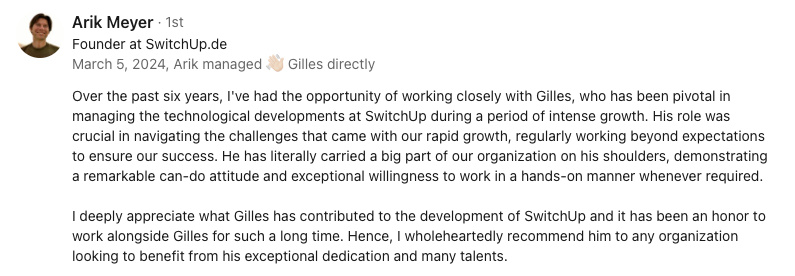Abstract:
The article emphasizes the critical role of human elements in the success of deep learning projects within startups, highlighting that technology alone is insufficient without the right team dynamics, goal alignment, and an innovative culture. It underscores the importance of fostering cohesive team dynamics through trust, open communication, and psychological safety, as supported by Amy Edmondson's research, to encourage innovation. The use of SMART goals and incentives ensures that personal and organizational objectives align, promoting motivation and productivity. The article also advocates for a culture of experimentation, inspired by Lean Startup principles, to maintain agility and competitiveness, noting the significant influence of transformational leaders in cultivating environments where curiosity and risk-taking thrive. Effective stakeholder communication through clear demonstration of project benefits, pilot projects, and transparency is vital for garnering support. Additionally, equipping teams with the right skills through online courses, workshops, and partnerships with academic institutions, such as the MIT-IBM Watson AI Lab, is essential for leveraging deep learning. The narrative includes case studies like Zebra Medical Vision and Element AI, illustrating the successful integration of technical prowess with human-centered approaches, highlighting that balancing technical and human resources is key to driving innovation and achieving startup success in deep learning.
Navigating deep learning can be challenging, especially for startups aiming to stay competitive. While new technology is exciting, its success largely hinges on people. How can we ensure our teams have the right skills and remain motivated to meet company goals? This article explores the significance of teamwork, goal alignment, and an innovative culture in deep learning projects. By focusing on these elements, startups can fully harness the potential of deep learning.
Understanding the human factor in deep learning implementation
In the fast-paced business environment, deep learning projects offer startups a significant edge. Beyond the technology, the people involved are crucial to making these projects successful. This section highlights the importance of teamwork, motivation, and aligning goals, particularly for European startup tech executives who must navigate compliance with EU regulations.
The role of team dynamics
Cohesive Team Dynamics
Effective teamwork is essential in deep learning projects. Trust and open communication within teams lead to success. Amy Edmondson's research on psychological safety demonstrates that when team members can speak up and take risks without fear, innovation thrives. An Administrative Science Quarterly study supports this by showing that psychological safety promotes learning and adaptability. Startups that foster open communication and collaboration are more likely to succeed.
Strategies to Enhance Team Dynamics
Enhancing team dynamics involves actively promoting collaboration and communication. Regular feedback sessions are crucial, providing team members with opportunities to discuss progress and improvements. These sessions can be held weekly or quarterly. Team-building activities also help create lasting bonds. A McKinsey & Company report suggests that structured feedback and team-building improve adaptability and learning. By implementing these strategies, startups can cultivate an enthusiastic and innovative environment.
Aligning individual goals with organizational vision
Setting SMART Goals
Aligning personal goals with the company's strategy can be achieved using SMART goals—Specific, Measurable, Achievable, Relevant, and Time-bound. This framework helps ensure personal efforts contribute to company success. For example, an engineer might aim to code more efficiently to help the company reduce development time. The Journal of Product Innovation Management highlights that when leaders connect personal and company goals, teams remain motivated and productive. This is especially relevant for startups navigating EU-specific challenges, such as adhering to regulatory standards.
Role of Incentives and Development Plans
In addition to setting goals, using incentives and development plans keeps team members aligned with company objectives. Performance bonuses and recognition programs foster engagement. Personalized development plans demonstrate a commitment to employees' futures, fostering loyalty. A Harvard Business Review study notes that such practices strengthen team cohesion, ensuring personal and company goals remain aligned.
Cultivating a culture of innovation
For startups, fostering a culture of innovation is key to long-term success. This section examines how creating an environment of experimentation and learning helps maintain a competitive edge.
Encouraging experimentation and learning
Following Lean Startup principles, a culture that values experimentation enhances startup flexibility and innovation. Eric Ries' methodology emphasizes iterative development and learning from feedback. By testing assumptions and listening to customers, startups can adapt quickly, increasing their chances of success. The International Journal of Entrepreneurial Behavior & Research supports this, showing that agility leads to innovation in competitive markets.
Psychological safety encourages experimentation. Amy Edmondson's research shows that when people feel safe to share ideas and take risks, they're more innovative. In such environments, failures become learning opportunities. Leaders play a crucial role by creating a space where team members feel free to explore new ideas.
Leadership's role in innovation
Leaders set the tone for innovation. Transformational leaders, in particular, inspire teams with a clear vision and encourage growth. The Journal of Product Innovation Management finds that such leaders create environments where curiosity thrives. They challenge assumptions, welcome new ideas, and take calculated risks, fostering continuous improvement. Visionary leaders align their vision with company goals, encouraging innovation. They might hold strategy sessions where team members share ideas and receive feedback. This open communication keeps everyone invested in the company's success. The Journal of Business Venturing highlights that regular dialogue encourages innovation within teams. For instance, in Berlin, startups often engage in cross-industry collaborations that drive innovative solutions.
Engaging Stakeholders with Effective Communication
Communicating Benefits and Value
To gain stakeholder support, clearly demonstrate how deep learning projects align with company goals and deliver tangible results. Stakeholders are more likely to support projects when they see concrete benefits:
- Alignment with Goals: Present projects as strategic initiatives driving goals like efficiency or new revenue streams.
- Measurable Outcomes: Highlight quantifiable metrics, like cost savings or improved productivity.
- Value Demonstration: Use examples or case studies to illustrate deep learning's impact.
Using visual aids and simple language helps non-technical stakeholders understand. Charts and infographics can make complex data more accessible. For instance, a flowchart might show how a new model improves operations. These visuals help stakeholders grasp project benefits, boosting support.
Managing Expectations and Demonstrating Value
Building stakeholder confidence starts with pilot projects. These small-scale tests showcase deep learning's potential:
- Demonstrate Feasibility: Provide proof of concept.
- Generate Feedback: Identify areas for improvement before full rollout.
- Build Confidence: Offer evidence of progress.
Maintaining stakeholder trust requires ongoing, transparent communication. Regular updates keep stakeholders informed and engaged:
- Consistent Reporting: Share progress through reports or meetings.
- Open Channels: Encourage feedback and address concerns.
- Transparency: Be honest about challenges to manage expectations.
Keeping stakeholders informed ensures their support and prepares teams with the skills needed for success.
Equipping Teams for Deep Learning Success
Success in deep learning relies on well-trained teams. This section explores training methods that prepare teams for deep learning challenges.
Approaches to team training
Online courses and certifications offer structured learning in deep learning. Platforms like Coursera and edX provide flexible courses for different knowledge levels. These are cost-effective for startups, enhancing team skills without sacrificing quality. Structured modules help employees build expertise aligning with company goals.
Hands-on workshops and bootcamps offer practical learning experiences. These intensive programs focus on real-world problem-solving. For example, workshops might involve building neural networks. This approach boosts confidence in handling real projects, bridging the gap between theory and practice.
Leveraging partnerships for ongoing learning
Collaborative research with universities gives startups access to cutting-edge knowledge. Partnerships like the MIT-IBM Watson AI Lab demonstrate the power of joint research. These collaborations allow startups to benefit from academic insights, leading to breakthroughs. Both academic and corporate entities gain from these projects, pushing AI boundaries.
Internships and conferences enhance skill development and knowledge sharing. Hosting interns offers fresh perspectives and potential talent. Conferences like NeurIPS provide networking and learning from experts. These events are excellent for staying updated on trends, ensuring teams remain at the forefront of technology.
Balancing technical and human resources
Balancing technical expertise with effective people management is crucial in deep learning success. This section examines successful case studies and strategies to optimize team dynamics.
Case studies of successful integration
Zebra Medical Vision exemplifies a strong mix of technical skill and human-centered design in healthcare. Their accurate algorithms for disease detection gained FDA clearance and are widely adopted in healthcare. This highlights the importance of aligning technology with user needs.
Element AI's multidisciplinary approach balances technical advancement with productivity. A diverse team of AI researchers and experts tailored solutions for clients, leading to their acquisition by ServiceNow. This shows that blending technical excellence with a strong human focus can drive success.
Optimizing team productivity and morale
Continuous learning and development keep teams engaged and competent. Investing in skill enhancement empowers teams to tackle new challenges. This boosts morale and productivity as teams use the latest tools.
Agile methodologies and empowering employees enhance morale and productivity. Agile practices promote flexibility and collaboration, allowing teams to adapt and innovate. Empowerment gives team members ownership, leading to job satisfaction and innovation. By using these strategies, organizations maintain motivated and productive teams, vital in deep learning.
Focusing on the human side of deep learning can transform your startup's potential into success. Strong team dynamics, aligned goals, and an innovative culture help startups maximize deep learning's benefits. Teams that communicate openly and prioritize psychological safety encourage creativity and adaptability. SMART goals align personal and company objectives, boosting motivation and productivity. Encouraging experimentation fosters learning and agility, essential in competitive markets. As these principles are applied, remember that the blend of technology and human dynamics propels innovation. Experiences from living in diverse environments, like Berlin or Beijing, can provide unique perspectives that enrich the approach to deep learning projects.














